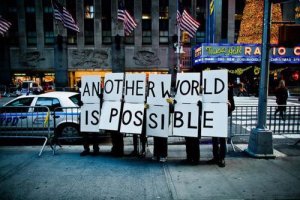The previous posts have explored the role of purchases in the consumer religion, letting go of the holiness of our purchases and the idolatry of our purchases. Now I want to outline the identity found in God’s economy as an alternative to the consumer identity constructed through our holy purchases.

I’ve done a lot of writing here on my thoughts about property in the Bible. This and the following posts might be a good place to start. I’ve also written a lot about economics and Sabbath and how they are related. While I don’t want to cover all of that territory again, I also don’t want you to have to read all that first. So, let me try to summarize what the economy of God looks like in the biblical narrative. Much of this also comes from God the Economist by M. Douglas Meeks which I hope to dive into here soon and which my friend Justin Tapp first recommended to me. His posts on the book are worth reading from a conservative Christian economist perspective.
Rock Your Oikos!
The term economy itself comes from the Greek word oikonomia. Meeks points out that the original meaning of this term had to do with the household. The purpose of economy was to make sure that everyone in the household, or oikos, was able to meet their needs. While modern economic philosophy is based on the assumption of unlimited wants and scarce resources, the economics of God assumes abundant provision for everyone’s needs with restrictions that help us meet those needs.
We still live in a world of abundant provision. Scarcity is not the reason that people go hungry in our world. Total global agricultural output currently produces somewhere around 3,500 calories per person per day. That’s enough to make all 7 billion people on the planet obese. Now, whether or not this production is sustainable long term and whether we are producing the best kinds of food for the world are questions for another day. The point is that the assumption of scarcity is the framework of the world, not God’s, economics.
 The economy of God, then, is not another system or ideology, but a household to which we belong. This is a vastly different starting point than the radically free individual which is the basis of free market economy. So, God’s household assumes and assures abundant provision for everyone. So, what does the exchange look like within this economy?
The economy of God, then, is not another system or ideology, but a household to which we belong. This is a vastly different starting point than the radically free individual which is the basis of free market economy. So, God’s household assumes and assures abundant provision for everyone. So, what does the exchange look like within this economy?
Economy of the Gift and the Meal
The economy of God includes exchanges and interactions that our current system does not account for. The central Christian concept of grace is the idea that God gives us something that cannot be earned, deserved or paid for. We can see the creep of economic ideologies into our theology when we insist on penal substitutionary atonement as the primary or only way of understanding Jesus’ death and resurrection. In other words, we assume that the relationship of God to the world can be best understood in terms of accounts payable and accounts receivable.
God’s economy, however, operates outside of this way of thinking and places the highest priority and value on including every member of the household, giving them dignity as creatures and justice in their relationship to other humans and the rest of creation. So, wherever relationships are broken or there exists injustice, God’s economy is not at work.
This can be compared to the sharing or solidarity economy in modern economic terms. In these models more modes of relating to one another are accounted for and similar values to the above are both encouraged and included.
 Jubilee and Sabbath Economics
Jubilee and Sabbath Economics
Here’s the problem: the economy of God is a vision for the way that the world should work, for the way that we should relate to each other and creation. That vision is a far cry from reality where we see injustice and oppression, a widening gap between rich and poor and on and on. So, how do we make that vision a reality in our everyday lives and decisions?
The Bible does not just give us this grand vision of the way things should be and leave us to wallow in our guilt. The biblical way for trying to implement these priorities and principles in real life interactions involves the Sabbath practices which I’ve discussed before. This includes incorporating rest for workers and the land, periodic pre-distribution of wealth and property and general shift toward right-relatedness between humans and each other and humans and the non-human creation. These were very specific practices given to Israel to make the vision a reality in their midst. They failed as miserably as we do. The question is how we can fail better.
In the next post, I hope to flesh out some ways and practices that might help us to live into this reality more without having to feel guilty about not buying fair trade chocolate.
0 comments on “Holy Purchases: Practices and Possibilities”